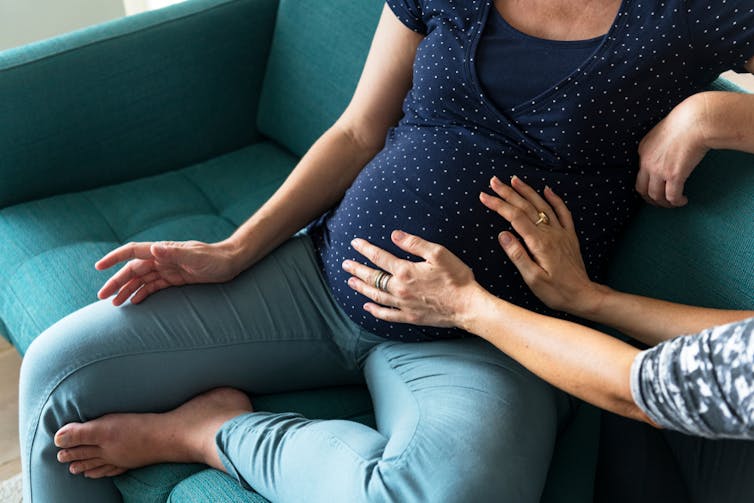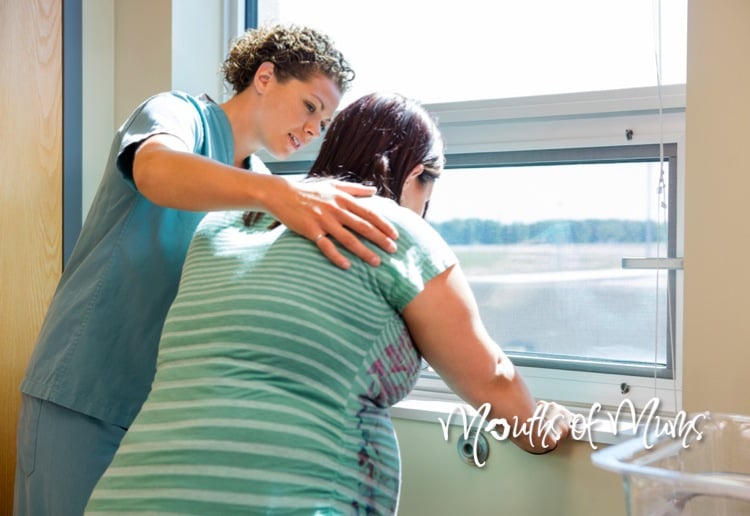What is a doula and how do they help women giving birth?

From shutterstock.com
Meghan A. Bohren, University of Melbourne
Women have traditionally been supported by a companion during childbirth, and there is good evidence this benefits both the woman and the baby.
The World Health Organisation recommends continuous support for women during childbirth. Yet across the world, initiatives promoting health facilities as the safest place to give birth have not necessarily respected this tradition.
But now we have new evidence on the ways women are supported during childbirth by a doula or other labour companion.
Our research has found labour companions (including doulas, partners, and family members) support women during childbirth by providing information, advocating for the woman’s needs, and providing practical and emotional support.
Importantly, our research also indicates pairing a woman with a doula from the same ethnic, linguistic or religious background as her may be an important way to improve equity and provide culturally responsive care.
Read more:
So your birth didn’t go according to plan? Don’t blame yourself
What is doula care?
The word “doula” comes from a Greek word meaning “woman’s servant”.
Doulas are trained, non-medical professionals who provide continuous physical, emotional, and informational support to women before, during and after childbirth, to facilitate the best possible birth experience.

Peter Oslanec/Unsplash
Doulas typically meet with a woman (and sometimes her partner or family) during pregnancy to help her to prepare for childbirth, build rapport, manage expectations and provide evidence-based resources.
When a woman goes into labour, she alerts her doula. The doula supports the woman throughout labour and childbirth. This is typically at a birthing clinic or hospital (some doulas may also attend home births).
Four ways to support women during labour
Our Cochrane review, published this week, brings together data from 51 studies across 22 countries looking at support provided by labour companions, including doulas.
First, we found through providing information, labour companions bridge communication gaps between health workers, such as doctors and midwives, and the woman. They keep her informed about the process of childbirth and her progress through labour. They may also provide her with tips around effectively using non-pharmacological pain relief, such as meditation or relaxation.
Second, labour companions advocate for the woman, speaking up in support of her and her preferences.
Third, labour companions provide practical support, which could include encouraging the woman to move around, providing massage, and holding her hand.
And finally, labour companions offer emotional support, helping the woman to feel in control and confident by praising and reassuring her, and providing a continuous physical presence.
Improved outcomes for mums and babies
The benefits of continuous support during labour and birth were highlighted in an earlier Cochrane review, which analysed data from 26 studies across 17 countries involving more than 15,000 women.
Continuous support was provided by a woman’s partner, family member, or friend; hospital staff (student midwives); or a doula.
The review found continuous support could improve several health outcomes for both the woman and her baby. Women may be more likely to have a vaginal birth (without the need for caesarean, forceps or vacuum extraction).
Read more:
Explainer: what are women’s options for giving birth?
In addition, women who receive continuous support may be less likely to use pain medications, may have shorter labours, and may be more likely to be satisfied with their birth experience.
The babies of women who receive continuous support may be less likely to have low five-minute Apgar scores, which assess babies’ health and well-being at birth and shortly afterwards.
Who can benefit from doula care?
Recent media has highlighted that doulas are fit for royals. Meghan Markle, the Duchess of Sussex, has hired a doula to support her during her current pregnancy.
In Australia, doula care typically ranges from A$500-A$2,500, depending on the doula’s experience and the services they offer. This cost typically includes one to two visits during pregnancy, attendance at birth, and one visit after birth.
While the cost of doula care may sound prohibitive, our findings highlight that providing community-based doula care for migrant, refugee and other foreign-born women in high-income countries may be an important way to improve equity and culturally responsive care.
When migrant women receive care from community-based doulas (from the same ethnic, linguistic, and/or religious background as them), they may feel more confident and less like “outsiders” in their new communities.
In Sweden and the United States, research has shown that foreign-born women supported by community-based doulas were more satisfied with their birth experiences, and doulas themselves felt empowered.
Community-based doulas may also be particularly beneficial for Indigenous women, whose traditional birthing practices are strongly linked to their cultural identities. In Canada, the British Columbia Association of Aboriginal Friendship Centres provides scholarships to pregnant Indigenous women to hire a doula.
Read more:
Death doulas can fill care gaps at the end of life
Doula services may be provided free of charge for low income people and families, as a way to improve equity. The Doula Project provides free doula services to low income women in New York City through volunteers.
Supporting women to have a labour companion or doula of her choice during childbirth is an effective way to improve health outcomes, and is an important component of respectful maternity care.
Labour companionship and doula support may increase equity directly through improved women’s empowerment and provision of culturally responsive care, and indirectly by reducing the over-medicalisation of childbirth.
Sarah Chapman, a knowledge broker at Cochrane UK, contributed to this article.![]()
Meghan A. Bohren, Lecturer in Gender and Women’s Health, University of Melbourne
This article is republished from The Conversation under a Creative Commons license. Read the original article.




















-

-
-
BellaB said
- 05 Apr 2019
-

-
-
Blossom said
- 23 Mar 2019
-

-
-
MrsA said
- 23 Mar 2019
-

-
-
mom19782016 said
- 23 Mar 2019
-

-
-
mom160421 said
- 22 Mar 2019
-

-
-
littlehandsofmine said
- 22 Mar 2019
-

-
-
mom114371 said
- 22 Mar 2019
-

-
-
DaffyD said
- 22 Mar 2019
-

-
-
mom206279 said
- 22 Mar 2019
-

-
-
Ellen said
- 22 Mar 2019

-

-
-
mom81879 said
- 22 Mar 2019
Post a comment7:26 pm
10:08 pm
9:38 pm
9:17 am
9:35 pm
4:59 pm
4:17 pm
2:08 pm
1:29 pm
1:29 pm
11:40 am
-

-
-
becstalou replied
- 22 Mar 2019 , 12:27 pm
ReplyTo post a review/comment please join us or login so we can allocate your points.